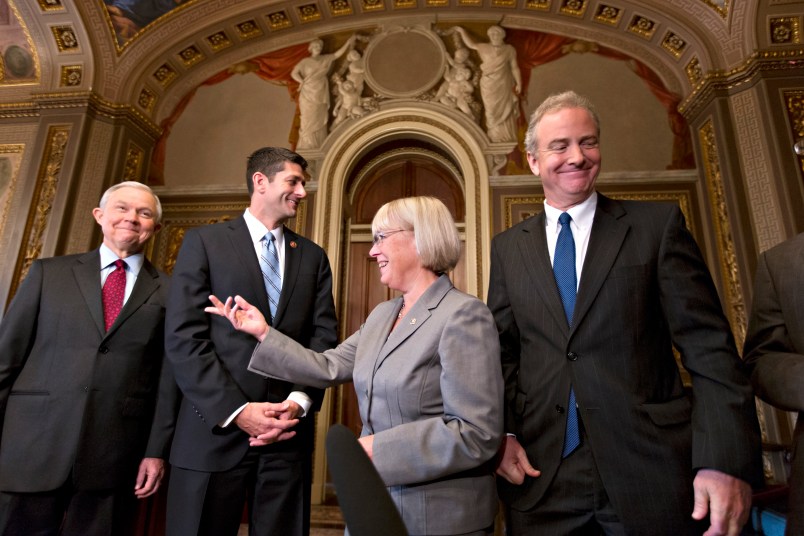When the big, bipartisan budget committee kicks off with its first meeting Wednesday, conferees will be given a daunting task: bridge the chasm that has divided Congress for years and left the country lurching from one crisis to the next.
The prospects for a comprehensive agreement — or a “grand bargain” — are virtually nonexistent. Republicans won’t touch tax revenues and Democrats won’t agree to cut Social Security or Medicare without significant new revenues.
But there is a possibility — not a very promising one, but a possibility nonetheless — for a small deal that replaces some of the sequester with a mix of targeted discretionary cuts and new revenue via one-time sales or fees — instead of raising tax rates or curbing loopholes.
The idea of fees or sales has been considered in previous deficit reduction discussions. It was raised last week by Rep. Tom Cole (R-OK), a deputy majority whip and budget conference member. Multiple senior aides say the idea is on the table. TPM put the question to leaders of both parties, and neither rejected it.
It’s not what Democrats want, but they haven’t ruled out counting them as revenue. “I’m looking at corporate tax loopholes,” Senate Budget Chair Patty Murray (D-WA) told TPM. “We’ll see.”
Senate Republican Conference Chair John Thune (R-SD) was also circumspect. “If there was not tax code revenue? I don’t know,” he told TPM. “Maybe in a small deal.”
A senior House GOP aide said he hadn’t heard much chatter about fees or sales. The aide was uncertain about the idea but, notably, wouldn’t rule it out.
“Replacing sequester cuts with smarter cuts and reforms is certainly an objective Republicans are working toward,” the aide said in an email. “But replacing spending cuts with revenue, even if it’s not from tax hikes or loophole closures, could face opposition. The goal remains: if spending cuts are going to be cancelled, they should be offset by other spending cuts.”
The White House and Democrats hate the draconian, across-the-board cuts to domestic and defense spending that took effect earlier this year. Republicans dislike the way the military cuts are apportioned but prefer them over new tax revenues. They’ll cling to every dollar of spending cuts they’ve extracted from Democrats. So unless the hardline GOP backs off its position and decides to compromise, tax loopholes won’t be touched.
Any deal to replace the sequester, Murray told TPM, “has to be fair and balanced.” And she was clear on what that meant: “Revenues have to be part of it.”
“Just as we are scouring the budget for ways to cut responsibly, we need to scour the tax code for ways to find revenues responsible,” she said. “And everyone has said there are ways to find corporate loopholes to help us with balancing this.”
Senate Majority Leader Harry Reid (D-NV) responded with a flat “no” when asked by a reporter on Tuesday if he’d accept a deal that changes the sequester without new revenues.
The question that the House-Senate budget committee may turn on is how revenue is defined. Does it ultimately have to mean tax loopholes? Or could it mean fees for the government, or “one-time things like timber sales,” as Cole suggested recently? The latter may provide a face-saving mechanism to both sides if there’s sufficient appetite to chip away at the sequester.
“Surely there isn’t going to be any Republican support for increases in taxes through the tax code,” Thune told TPM. And even fees and sales would be a tough sell — but not out of the question. “It’s going to be very hard to get our guys to vote for revenues, tax code related or not,” he said. “There might be Republicans who would support some non-tax code revenues. I’m not suggesting I know who they are or what that number is.”
There are many pitfalls to such an agreement. Democrats may declare fees and sales insufficient. Republicans may be intransigent enough to reject even non-tax revenues. But if a deal is to be reached, this is how it will look. The appetite is there — the question is whether there’s a way to satisfy both sides’ political prerogatives.
“Working together, we can find common ground that will enable us to reduce or even eliminate the impact of the sequester and continue to lower the deficit,” Cole said.






